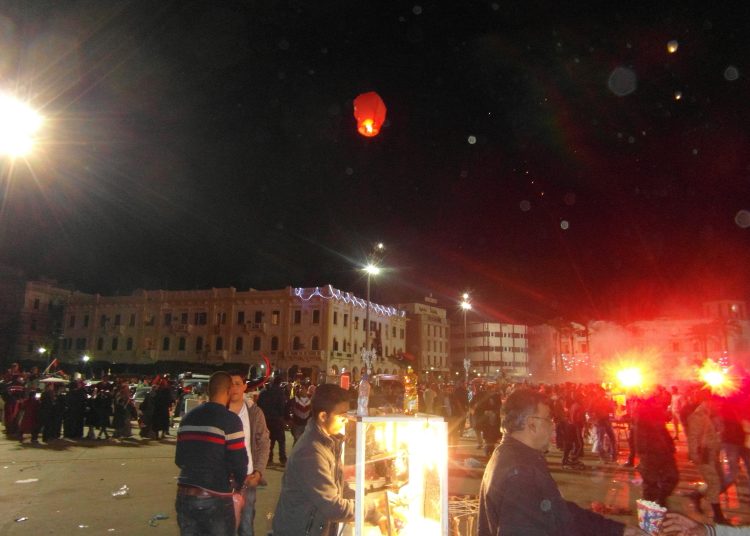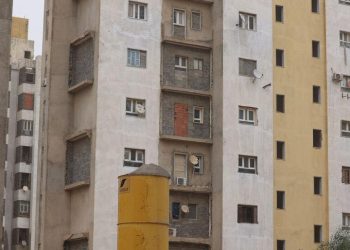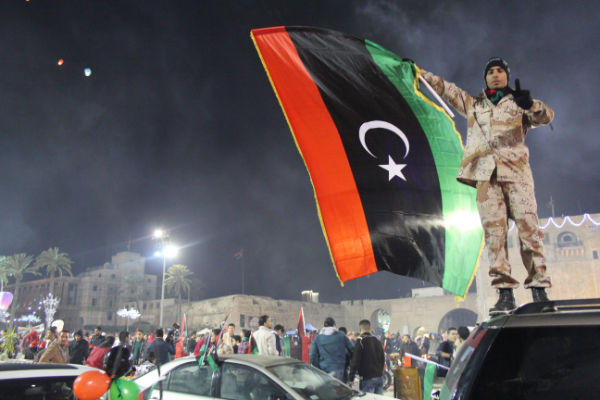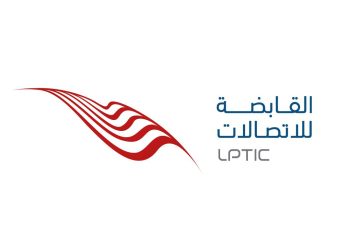By Sami Zaptia.
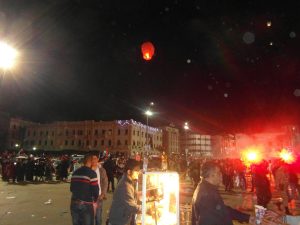
Tripoli, 17th February 2013:
Here we are two years on from the start of Libya’s 17th February Revolution. Two years . . .[restrict]on from the day the Libyan unarmed public came out on to the streets to peacefully demonstrate against Qaddafi’s 42 year dictatorial regime – only to be met with brutal force.
Two years on and there are some Libyans who are not happy with the progress made by the Revolution. This discontent is not universal and is expressed most vocally in the eastern part of the country and especially in the second city of Benghazi.
But is this discontent and sometimes threat to break up the nation into federations justifiable? Has the nation deteriorated since liberation or has it made steps forward? Are things as bad as some critics make them out to be, or are these just the exasperations of a people with overly raised hopes and expectations post the collapse of the 42 year old dictatorship?
The most expressed criticisms are that the new legislature, the GNC, and the new government of Ali Zeidan, are ineffective and slow in bringing in progressive reform and change. Many people feel that in two years there should have been more visible change.
This lack of progress is deemed to be especially so in the security arena, all over Libya in general, and in Benghazi especially. The security demands also included the need to enroll the former fighting groups and militias (thuwar) into the official security forces.
The other area where Libya’s political elite have come in for some criticism has been in the delay in the drafting of the new constitution and setting the nation on course for its next General Election. There has also been the demand for the enforcement of the “Political Isolation” law which is the law to prevent those closely involved with the old regime from holding high political or administrative positions.
Equally, on the economic front, the Libyan public has expected more jobs, better paid jobs and a more active economy. They expected to get to taste more of the fruits of their oil wealth that they think Qaddafi had held back from them for decades.
It is true that towards the end of the Al-Kib government and up to the election of the Zeidan government, there was the perception that Libya was drifting in political limbo.
The GNC and government had struggled to impose their legitimate will both in some cities, and especially Benghazi, and over a geographically spread nation with long, porous and difficult to defend borders.
On the street, many of the disparate thuwar or militias were still resisting the push to unite under official state organs amid tensions between the then Minister of Defence and Chief of Staff and the Libyan National Army and the Supreme Security Committee.
The lengthy process the GNC took to elect a successor to Prime Minister Kib and the messy failure with which Abushagur failed to get both his nominated governments approved, all added to the feeling stalemate. The perception was that Libya was going nowhere, if not beginning to fall into reverse. There was also the perception left by the failed Abushagur governments that party politics were parochial and not in the nation’s interests.
However, these are perceptions that are probably based on unrealistic expectations of how quick a post Qaddafi government could progress and an unrealistic vision of what democracy really is and how it operates.
If we step back a little bit and look at Libya’s economic fundamentals we will see that the foundations are sound to act as a springboard for future development and progress.
Libyan oil production, for example, was ramped up in record time after the end of the conflict by Libyan engineers to its normal 1.5 million barrels of crude oil per day. The international crude oil price has, fortunately for Libya, hovered around the US$100 since the 2011 Revolution.
To this end the IMF forecasts that Libya’s hydrocarbon income will be US$ 62 billion in 2013 and that its economy will experience growth of 16.5% in 2013, 13.5% in 2014 and 9.2% in 2015. The IMF also reports that Libya’s foreign assets will be US$ 206 billion in 2013, US$ 212 billion in 2014 and US$ 214 billion in 2015.
These are figures that we must not take for granted and that, pro rata, many a developed nation currently suffering huge deficits, let alone our Arab Spring neighbours, would give their right arms for.
Equally, there were, we are informed by the government, over US$ 150 billion’s worth of projects started by old regime in Libya. Most of these are deemed essential to the progress and development of Libya and will need completion. The process of their completion will lead to much economic activity directly and indirectly benefiting many Libyans.
These projects include no less than five airports, including Tripoli and Benghazi airports, the Tripoli Third Ring Road, the Railway system, shopping malls, the hundreds of thousands of apartments, as well as their utilities of water, electricity and sewage works – spread all over the country.
With regards to electricity generation, even if it were not for the war damage that has caused and will continue to cause power cuts in summer, Libya’s generation capacity would have needed expansion so as to keep up with annually increasing demand.
There are also ongoing projects to expand and improve Libya’s health sector, its sea ports, the education sector, with the upgrading of schools and universities as well as its communication sector.
Let us remember that it was only in August 2011 that Tripoli was finally liberated and October 23rd that the whole of Libya was declared liberated. That is, Tripoli, the capital, has actually been free to progress and develop for only 17 and a half months and the whole of Libya officially for only 15 and a half months.
And during this short period of time there has been progress – progress that I am afraid our raised expectations have taken for granted. Politically, Libya has been able to hold a successful democratic election for its interim parliament, the GNC. We have been able to transfer power peacefully between the NTC and GNC as well as the various Prime Ministers of Jibril, Al-Kib and Zeidan – all peacefully and within just two years.
On the security front, in just two months, the new Zeidan government has been able to better impose the state’s will under the more proactive and effective Interior Minister Ashour Shuwail and Defence Minister Baraghti.
The security situation is not perfect and the city of Benghazi and Libya’s huge borders are still presenting a challenge. But to say that there is no progress would be inaccurate. To say that progress is slow would be to have higher expectations.
The most important progress in Libya has been the fact that today in Libya there is real hope and there is in my opinion real freedom in the post February 17th era. Not everyone’s hopes and aspirations will be either fulfilled, or fulfilled first.
Democratic politics is competitive. There will always be the strong and the weak. There will always be those who are left behind. Who said a post Qaddafi dictatorial era will be a nirvana? There are no political utopias in any other developed democratic states. Some states are better than others.
Some states deliver a more efficient democracy than others. But there is no political paradise. All systems have disadvantages – and so does the democratic system. It’s just that there is no better system operating out there at this moment. So we have to accept it warts and all and go through the process.
But at least post Qaddafi there is hope and the ability to affect change. Today, as I write, a group of only thirty maimed war injured are still engaging in a sit-in in our GNC. The GNC have been forced to move into the hotel next door to continue the nation’s business. Just thirty Libyans have been able to influence our parliament. Under Qaddafi six million people could not.
The dynamics between the ruling and the ruled have totally changed today. There is definitely hope and there are definitely the levers for ordinary Libyan citizens to influence their ruling class.
But hope must be tempered with real politic. Getting rid of Qaddafi does not give us a magic wand. There is no switch to be turned on that converts Libya organizationally and structurally at least, into a Dubai. Progress and development take time and work. Hard work over decades to undo the damage of four decades of neglect, destruction and erosion of our infrastructures and capabilities.
In my opinion there has been piecemeal progress. It has been slow. Maybe too slow – but part of the problem has been us the Libyan population which has been overwhelming the political elite with too many simultaneous demands. Demands that have been pent-up for decades. Demands that our current political rulers do not have the human, procedural or structural capabilities to fulfill.
There is a price for democracy and procedural democratic rule. We forget Qaddafi and the revolution destroyed many things – including the decision-making process and the mechanisms to deliver policy. Our capabilities to govern and administer need to be rebuilt in a new democratic way.
Democracy is procedural. Every decision must be debated and approved – which takes time. Progress and development in a democratic, consultative society take time. This is more so when the democratic system itself is being constructed.
A study of democratic progress in the rest of the world shows that democracy often took decades and even centuries to develop. For Libya the process of democratization is just two years old today. Therefore a sense of perspective must be maintained. [/restrict]
